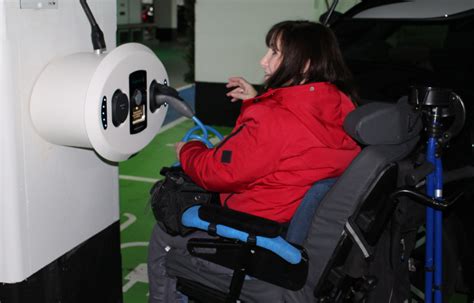All EV chargers available to the public should be easily usable by people with disabilities, and as of right, campaigners for disabled drivers are insisting.
Recharge UK, the e-mobility arm of the REA (Association for Renewable Energy and Clean Technology), says that mandating accessibility requirements for public electric vehicle chargepoints will ensure wheelchair users always have equal access to charge their vehicle.
PAS 1899:2022 is the standard introduced last year, intended to ensure that charging an electric vehicle (EV) is accessible for all users, including disabled people. It gives designers, procurers, and installers essential specifications on how to provide accessible public charge points for electric vehicles.
Adoption of the PAS 1899:2022 standard is voluntary only, though. Some leading charge point operators (CPOs) have taken the initiative, assessing new sites and installations to ensure they comply, and initiating retrofits and additional work, where they do not.
But Recharge UK insists motorists with disabilities including mobility problems will miss out, unless PAS 1899 is mandated by the government.
“Electric vehicles are for everyone” said Matthew Adams, the campaign group’s transport policy manager.
“However, currently what we see is some charging infrastructure that is not built with wheelchair users and those with accessibility requirements in mind, in many cases”.
The absence of a universal mandate favouring accessibility of charging could put off wheelchair users from purchasing an EV, Adams argues, as well as deterring disabled people with other accessibility requirements.
“Recharge UK believes electric vehicles are for everyone and that we should seize the opportunity to design accessible infrastructure from the ground up, “ Adams went on.
The group is calling for government to mandate that all public charging sites, where feasible, have accessible charging mandated.
Considerations needing to be incorporated into a universal mandate including physical factors such as kerb height or ground type close to chargepoints, and points’ placement, labelling and spacing within the public realm; the information, signals and indicators to be provided to users; as well as cables and cable management systems, bollard spacing, colours used on screens, weight and force and ease of use of the equipment).
Fellow campaign groups ChargeSafe and FairCharge back Recharge UK’s stance.
ChargeSafe’s CEO & co-founder Kate Tyrrell commented: “The challenge for 16 million disabled people in the UK to adopt electric vehicles is exacerbated by inadequate consideration from key stakeholders regarding space, inclusive design and safety at charging sites.
“While the BSI PAS 1899:2022 norm serves as a recommendation, the absence of consequences has led to inaccessible chargepoints violating the 2010 Disability Act”. Tyrell said
FairCharge’s founder Quentin Willson added: “We want to see a national infrastructure that’s available and inclusive to all. We have a moral duty to make sure all drivers, including disabled (both hidden and visible), have easy access to chargers wherever they are. Because that’s the fairest way.”




